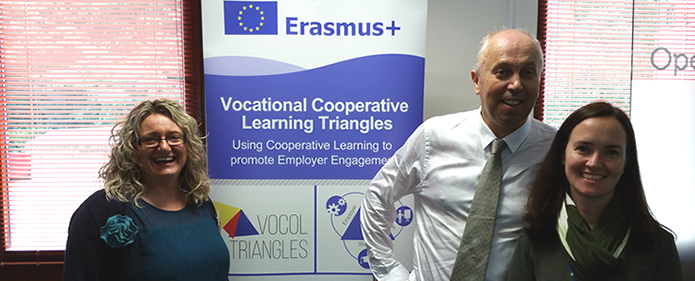
Dundee and Angus College has successfully brought together the worlds of work, education and young people by engaging learners and over 100 employers.
In Scotland 32% of employers recruit young people directly from education. Therefore following recommendations for developing Scotland’s young workforce to reduce youth unemployment, there is a drive to ensure closer collaboration between schools, colleges and industry.
The Key Action 2 VET ‘Vocational Cooperative Learning Triangles: Using Cooperative Learning to Promote Employer Engagement’ project, led by Dundee and Angus College, has created ‘triangles’ to bring together employers, teachers and learners. This is to develop the transversal skills beneficial to both young people for their career development and relevant to employers who can fully utilise these skills to support company growth.
The project has engaged employers and learners in the design and delivery of training courses and produced a range of resources including a training guide on cooperative learning in the context of vocational education, a training video and co-operative learning short course.
Over 100 employers have been engaged across the five countries and training has been cascaded to over 75 teachers across regional and national VET networks.
Benefits to learners and teachers
Project manager Iverene Bromfield said the results of the project had been overwhelmingly positive. Learners involved in the training produced as a result of the project were more motivated, had more self-awareness and 95% said they had received increased support from their teachers. Over 25 teachers have been involved in the project in the UK. They have been able to make new connections and relationships, reaching and teaching over 700 students as a result of their up skilling in co-operative learning and employer engagement.
Dundee and Angus College has also developed seven lesson plans for co-operative learning activities covering the vocational areas of sports coaching, social care, construction and animal care with designed for Scottish Credit and Qualifications Framework (SCQF) levels five, six and seven.
Learners which have participated in this programme will be definitely better prepared for challenges connected with their entering of the labour market in near future. - Employer, Charles Goodall, Angus Care in the community
Engaging with employers
Employers said it was a good experience to be involved in the learning process, as many of the key transversal skills recognised through project surveys were the most difficult to find in graduates and new employees. As a result of the project 75% of employers reported some or a noticeable improvement in students' understanding of the requirements of the workplace.
The project also involved associate partners to ensure the outputs were relevant for the labour market. These included social care providers Angus Care in the Community, Dundee City Council and Dundee and Angus Chamber of Commerce to provide an insight into the employment issues of their respective sectors. Alison Henderson, Chief Executive of Dundee and Angus Chamber of Commerce, said the project would bring radical benefits to employers and learners in Scotland by developing transversal skills.
She said: "I would like to reiterate how strongly I feel that this is a very worthwhile project and one which could bring radical benefits to employers and learners locally here, across Scotland and beyond. It helps develop ‘transversal’ skills which employers recognise will help to more fully utilise trainees’ technical expertise and contribute to company growth or organisational effectiveness...this type of project is of real benefit and value."
Sustainability
The active participation of local Associate Partners in the project, including Dundee and Angus Chambers of Commerce, will ensure their continued buy-in to promote results once the project is finished. This will contribute to the multiplier effect and increase overall impact. Project resources will be used as the basis for future training sessions related to co-operative learning and the further development of transversal skills and employer engagement activities.
Visit our employability webpage for further examples of Erasmus+ projects working on this theme.
